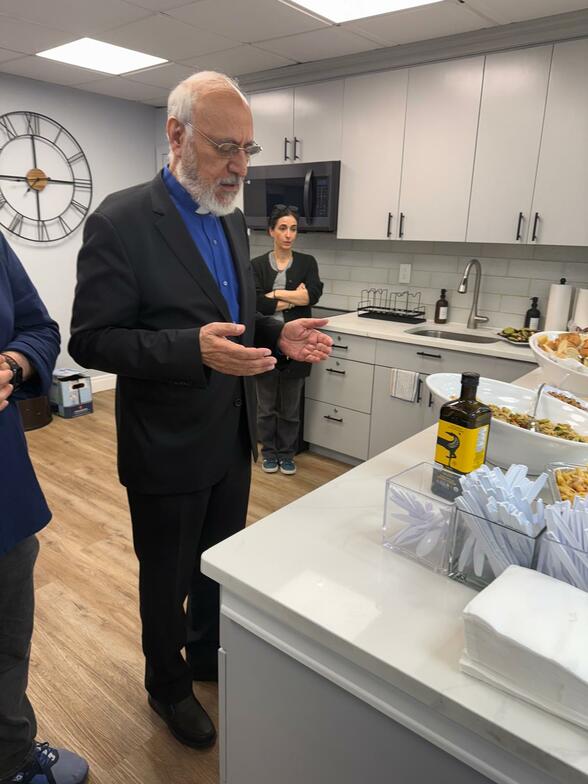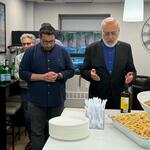Faith Over Fear: Father Nareg Terterian Explores Anxiety, Trust, and Spiritual Resilience St. Sarkis Church | Tuesday Evening Lecture Recap
On the fourth Tuesday of St. Sarkis Church’s highly anticipated weekly series, Pasta with our Pastor, Father Nareg Terterian, offered a profound and multifaceted lecture on Anxiety, Fear, and Trust in God. Speaking candidly and humorously, Der Nareg acknowledged the evening’s culinary experiment, having personally cooked the dinner. He joked about the leftover pasta as proof that next week’s chef, Yn. Annie would be welcomed back with open arms.
But the real nourishment comes in how Der Nareg helps us understand how spiritual faith and psychological health are deeply intertwined. In the first three lectures of the series, Der Nareg explained that faith gives us a foundation of identity, purpose, and hope, anchoring us in something greater than ourselves through our union with Christ, the way. Der Nareg helped us understand that this truth is not just theological - it is deeply personal in our relationship with God and ourselves. He explained how this truth that we are God's beloved children helps us heal our emotional wounds, and let in the Holy Spirit, our spiritual counselor, who is a continual presence to help us live regulated, whole, and hope-filled lives.
With this foundation laid, Tuesday’s talk delved into anxiety and fear, and the spiritual and psychological tools available to us to ensure that these emotions don’t undermine our well-being. Der Nareg set the stage by acknowledging that anxiety and fear are natural and real, but addressable and treatable through a dual perspective: spiritual resilience through trust in God and psychological tools such as Cognitive Behavioral Therapy (CBT) to regulate and understand anxiety.
A Dual Lens on Fear
With characteristic warmth and humor, Der Nareg confessed to feeling "under scrutiny" with both medical and spiritual professionals in the audience by acknowledging the presence of Dr. Lois Najarian, a renowned psychiatrist, and His Eminence Archbishop Oshagan Choloyan, a Biblical scholar and our former Prelate. “I like pressure,” Der Nareg admitted. “I work better under pressure.” That theme—how pressure manifests in our bodies and minds—was central to the evening’s discussion.
To make the lecture more digestible (a nod to the post-dinner setting), Der Nareg reduced his use of slides to make more time for discussion and questions. He began by outlining a foundational definition of anxiety: a natural human response to stress that becomes problematic when it is persistent, overwhelming, or interferes with daily life.
He explained the multiple facets of anxiety—physical (racing heart, dizziness), emotional (irritability, fear), cognitive (racing thoughts, indecisiveness), and behavioral (avoidance, compulsive actions). From the common “Monday morning tummy ache” in children to the adult experience of social anxiety or panic attacks, Der Nareg emphasized that anxiety, while widespread, should not be dismissed or normalized if it becomes debilitating.
Understanding the Root Causes
Diving deeper, DerNareg reviewed the clinical classification of anxiety disorders from the DSM-5, including Generalized Anxiety Disorder, Panic Disorder, Social Anxiety, OCD, PTSD, and more. He explored the roots of anxiety through a biopsychosocial lens:
- Biological: Genetic predisposition or imbalanced brain chemistry
- Psychological: Personality traits like perfectionism or unresolved trauma
- Environmental: Life changes, stress, and instability
He noted that many anxious behaviors are learned responses—maladaptive strategies that once served us in childhood but have outlived their usefulness. “Anxiety is a chronic overcorrection of the fear system,” he explained.
Trauma, Defense Mechanisms, and Adult Behavior
A key segment of the lecture focused on how trauma impacts our nervous system and distorts our sense of safety. Der Nareg outlined the classic trauma responses: fight, flight, freeze, and fawn. He connected these with everyday adult behaviors: the controlling partner (fight), the avoidant spouse suddenly fixing the backyard (flight), the indecisive individual stuck in fear (freeze), and the chronic people-pleaser (fawn).
He likened these behaviors to learned scripts that play out automatically, like reflexively thinking of the word “lamb” when hearing “Mary had a little...”
Healing and Hope: Psychological and Spiritual Tools
While acknowledging the importance of professional treatment—including CBT, mindfulness, and medication—Der Nareg emphasized the power of naming emotions, questioning rigid thoughts, and building new internal narratives.
Three transformative questions were highlighted:
- What am I feeling right now?
- Why am I feeling this way?
- How else can I think about this?
He said these questions can interrupt the spiral of fear and create space for clarity, options, and healing.
Trust in God: A Pathway to Spiritual Regulation
On the spiritual side, Derr Nareg reflected on how anxiety and fear can erode our ability to trust in God and others. He made the case that faith isn’t the absence of fear, but the courage to believe in God's presence and providence amid fear.
He linked spiritual trust to nervous system regulation: “Cultivating trust in God can support emotional healing and relational security.” He said inconsistent caregiving, betrayal, and abandonment can make trust difficult, but the faith journey invites us to heal those wounds.
The evening wasn’t just an academic exercise but a community experience that reinforced the idea that spiritual faith is a wellspring of psychological strength. Der Nareg thanked those who had sponsored the meals and reflected on how something as simple as sharing dinner can foster togetherness—a needed balm in anxious times.
Oshagan Serpazan delivered concluding remarks, quoting Jesus' words from the Gospel of John: “Peace I leave with you; my peace I give you. I do not give to you as the world gives. Do not let your hearts be troubled, and do not be afraid” (John 14:27). Serpazan emphasized that the best way to combat anxiety is to have the peace of Jesus in our hearts.
As the night concluded, attendees left not only with leftovers but also with new language, deeper insight, and a renewed invitation to trust in themselves, in each other, and God.
The Tuesday Evening Lecture Series continues next week with a return to Yn. Annie’s cooking is a new topic for exploration. All are welcome to attend.







